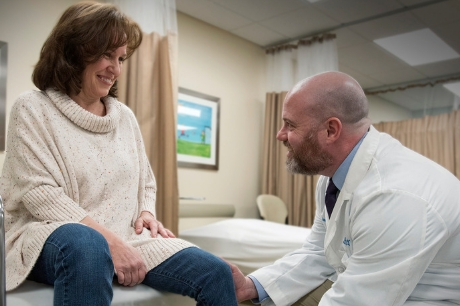Weight loss surgery relieves chronic knee pain
Lisa Houck, 43, underwent weight loss surgery in place of a knee replacement. After bariatric surgery, Lisa no longer experiences knee pain and is healthier than ever.
“I had sleep apnea and knee pain and I was on the path toward pre-diabetes,” says Lisa Houck of Bloomsburg.
The 43-year-old watched both of her parents become amputees because of diabetes. “My mom, who’s about to turn 70, lost her leg when she was 47. She started losing her eyesight when she was 48.”
If someone in your immediate family has diabetes, your risk of developing diabetes increases.
When considering weight loss surgery, your doctor will conduct a thorough family and personal health history including your BMI, past attempts at weight loss and current health conditions.
“I worked with a dietitian for a year. I went to the behavioral health appointments... it was challenging,” says Lisa who travels often for work. “I knew I needed to make big changes. I never ate breakfast – I’d eat when I had time to eat. It was never a priority for me. The dietitian taught me that my body was starving, and I needed to figure out how to eat every few hours.”
While Lisa was making changes with her diet and getting ready for bariatric surgery, she was also thinking about a knee replacement.
“By performing weight loss surgery before total knee replacement surgery, individuals may have a faster recovery. For some individuals, the need for knee surgery may be delayed or even eliminated,” says Dr. Still. “Individuals who suffer with obesity are more likely to require knee replacement decades before an individual of normal weight because extra weight adds wear and tear on the joint.”
Lisa had surgery on February 28, 2017, performed by bariatric surgeon Dr. Anthony Petrick.
“Before I had bariatric surgery, Dr. Petrick was very clear, I needed to be on board with the lifestyle changes. This was serious."
Lisa weighed 245 pounds when she started this weight-loss journey. Now she’s 165 pounds and no longer feels pain in her knees.
“I’m almost two years out from surgery, and I feel great! I’ve learned so much. If I only had a fast-food option for dinner, I used to skip eating altogether. Now, I know I can make better choices even with limited options. And I always have breakfast! My favorite is avocado toast – it’s very filling and one of my favorites with whole grain and an over medium egg. It’s so delicious!”
The 43-year-old watched both of her parents become amputees because of diabetes. “My mom, who’s about to turn 70, lost her leg when she was 47. She started losing her eyesight when she was 48.”
If someone in your immediate family has diabetes, your risk of developing diabetes increases.
Making lifestyle changes to lose weight and relieve chronic pain
With chronic knee pain that made walking up and down stairs difficult, knee surgery was on Lisa’s mind. Paired with severe sleep apnea and a family history of diabetes, Lisa decided it was time to make a change. She made an appointment with Geisinger’s Center for Nutrition and Weight Management to learn about bariatric surgery.When considering weight loss surgery, your doctor will conduct a thorough family and personal health history including your BMI, past attempts at weight loss and current health conditions.
“I worked with a dietitian for a year. I went to the behavioral health appointments... it was challenging,” says Lisa who travels often for work. “I knew I needed to make big changes. I never ate breakfast – I’d eat when I had time to eat. It was never a priority for me. The dietitian taught me that my body was starving, and I needed to figure out how to eat every few hours.”
While Lisa was making changes with her diet and getting ready for bariatric surgery, she was also thinking about a knee replacement.
Lisa sees results after weight loss surgery
Dr. Christopher Still, director of Geisinger’s obesity institute, is studying whether it’s better for a person with obesity to have weight loss surgery before a total knee replacement.“By performing weight loss surgery before total knee replacement surgery, individuals may have a faster recovery. For some individuals, the need for knee surgery may be delayed or even eliminated,” says Dr. Still. “Individuals who suffer with obesity are more likely to require knee replacement decades before an individual of normal weight because extra weight adds wear and tear on the joint.”
Lisa had surgery on February 28, 2017, performed by bariatric surgeon Dr. Anthony Petrick.
“Before I had bariatric surgery, Dr. Petrick was very clear, I needed to be on board with the lifestyle changes. This was serious."
Lisa weighed 245 pounds when she started this weight-loss journey. Now she’s 165 pounds and no longer feels pain in her knees.
“I’m almost two years out from surgery, and I feel great! I’ve learned so much. If I only had a fast-food option for dinner, I used to skip eating altogether. Now, I know I can make better choices even with limited options. And I always have breakfast! My favorite is avocado toast – it’s very filling and one of my favorites with whole grain and an over medium egg. It’s so delicious!”
Next steps:
Find a gastroenterology specialist
Learn how to calculate your BMI

Content from General Links with modal content




